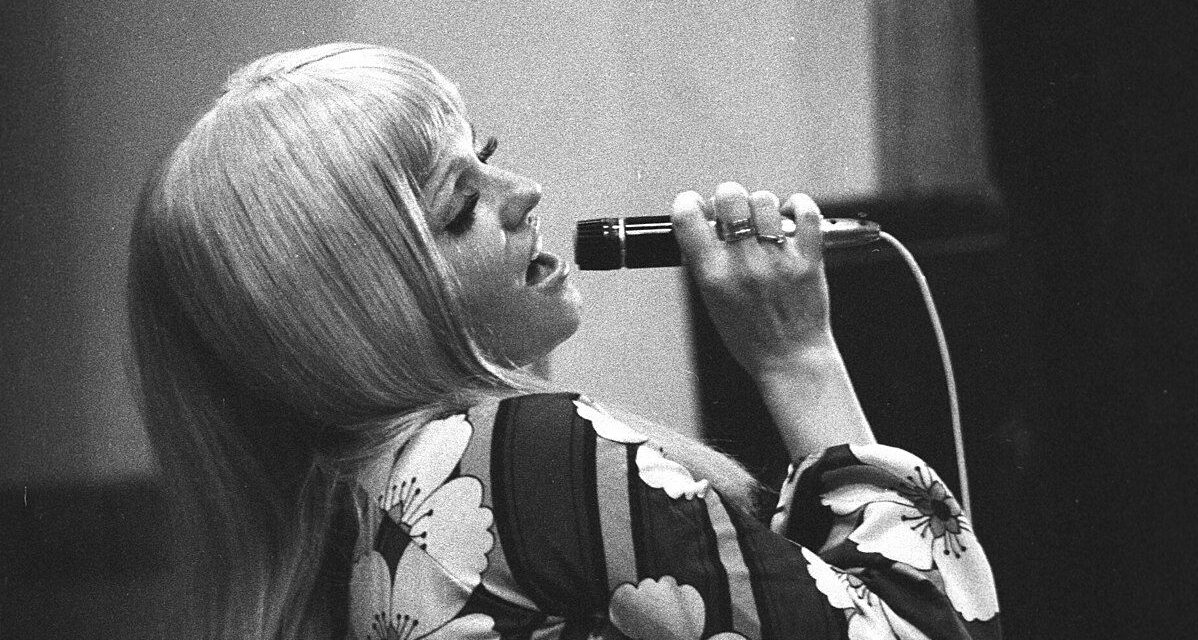"Zsuzsa Cserháti became a real wild person on stage over time, because she had that real quarries in her. (…) He also had that mysterious something that only a suburban jobber can know."
Zsuzsa Cserháti was one of the finest singers of her generation, according to professional opinions, only Kati Kovács had similar performance skills and vocal talent.
The latter singer even "gifted" a hit made for her to her colleague, which is not exactly a usual gesture in their profession. However, after a self-conscious and justified decision, Zsuzsa Cserháti was forced to spend fifteen years on the sidelines, while the filigree beauty gained more than a hundred kilos due to an illness, and the artist, who was already struggling with anxiety, no longer dared to go on stage after a while. However, thanks to persistent friends and patrons, he returned to the limelight and even surpassed the successes of the early years of his career. In addition, beyond his fiftieth year, the renewed popularity was also a burden for him, under which he finally collapsed. Of course, the question is whether it was really only his own sensitivity that led to his early death?
A precious stone in Lake Balaton
In the early 1970s, Zsuzsa Cserháti sometimes performed as a singer at the Balaton Restaurant in Akácfa Street. The place is a cheap canteen during the day, and a semi-legal card club from four in the afternoon to nine in the evening. It will be slightly rearranged until ten in the evening, and then it will be labeled as a meeting place for girls of joy and their friends, with a musical program, and the smell of kale that cannot be vented due to the canteen function. The place is run by a certain Mr. Lovas, whose father, Róbert Lovas, wrote the big hit of the time, the dance song "The little girl at the piano".
Zsuzsa Cserháti was originally contracted as a dancer, but it turns out that she can also sing.
He mainly just sings songs, joking with the audience between two numbers. However, at such times, he throws his head back, closes his eyes, and sings from the soul genre with the experience of pronouncing each song. The magic is enhanced by the fact that the mystical voice emanates from a blonde, fragile little girl. It happens at this time that the audience falls silent, and it seems as if the waft of cigarette smoke also freezes. But it is also not unprecedented that the magic does not affect the guests and professional girls who are otherwise focused on other pleasures.
The situation is different with Kati Szécsi, the trafficker's daughter of the service unit. He is also impressed by the way Zsuzsa Cserháti carefully prepares her makeup in front of the large mirror hung next to the wardrobe.
And when she really takes over the stage, even though the traffic girl is enchanted by her voice, it almost hurts her to sing where she sings.
Then one day the traffic girl's younger brother, the dance singer Pál Szécsi, known all over the country, mentions to his sister that he is looking for female vocalists for his next tour. Kati Szécsi answers her brother: she knows a gem who can be heard in the Balaton Restaurant in the evenings. At first, Pál Szécsi just smiles at his sister's suggestion, thinking that Kati just wants to break up with her famous brother in front of the restaurant's guests. In the end, he stands on a rope, and one night, huddled in the back of the room, he listens to the supposed gem.
In the next two years, Zsuzsa Cserháti will be a regular performer at Pál Szécsi's concerts.
In addition, his own singing career begins, with a success that seemingly nothing can stop.
She is preparing to become a ballerina, she will be behind the counter
Zsuzsa Cserháti was born on June 22, 1948 in Budapest. His maternal grandfather was the director of the Kőbánya Brewery. Zsuzsa and her younger sister Aliz spent their childhood in their maternal grandfather's service villa on Gitár utca in the quarry. In a civic environment, with spacious rooms, beautiful furniture, and a lavish garden. Of course, the children's parents also lived there, but they were estranged from each other even under such circumstances.
In connection with their divorce, the little girls perceive a harsher layer of reality for the first time.
Their mother soon remarried. Zsuzsa Cserháti later said: she loved her second father more than her father. But already on a different scene: after the grandfather's retirement, they have to move out of the villa, and the girls end up in a panel in a quarry with their foster father and mother. The girls' half-brother, István, was also born there. However, over time, their mother also separated from her beloved foster father, who soon died of a brain tumor.
The girls' mother is also an exemplary mother. Using all her strength, she tries to make her daughters forget that they live in a broken family. Zsuzsa Cserháti completes the eighth grade in elementary music and learns ballet from a very young age in a private school. However, around the age of nine and ten, he was unsuccessfully admitted to the Ballet Institute twice. Disappointment, but he decides not to stop moving.
He starts doing gymnastics in the Honvéd and also wins a national high school championship.
In addition to sports, he often takes singing lessons with a private teacher. Her mother once trained to be a singer, but her factory director father forbade her from the frivolous profession. Her mother supports Zsuzsa Cserháti, as in everything, in her ideas as a singer. At the same time, it is also not in question: just for the sake of security, you will need a civil occupation with a solid background.
He completes his secondary studies at a trade vocational high school, and obtains a qualification as a watch and jewelry salesman. In the 1960s, he started working in various departments of the Fashion Hall, then became a department manager in the perfumery department.
Who knows what?
Zsuzsa Cserháti - including her student years - worked as a salesperson at Divatcsarnok for nine years. And at home, he listened with fascination to the soul performers on the Luxembourg Radio's music broadcasts. At that time, the genre was not yet mainstream in Hungary, of which Zsuzsa Cserháti became one of the first domestic fans.
At work, they know about his attraction to music and singing, etc
at the suggestion of the KISZ organization of the Divatcsarnok, he participates in one of the most popular national contests of the 1960s, which also provided TV appearances for the best ones, Ki mit tud?.
Zsuzsa Cserháti performs well in the district and Budapest rounds, but she does not appear on the screen. At the same time, thanks to the competition, he will soon be able to perform with groups at various events, such as Thomastick, which was the second place in the 1966 amateur music competition with three hundred and fifty entrants, one place behind the winning band Illés.
He is also invited to sing by the Rangers, of which Rezső Soltész was one of the founding members.
In 1969, he performed mainly in construction camps, but on one occasion he was able to tour in Yugoslavia and Algeria. Years later, he said in this regard:
Interkoncert was contracted to two musicians, Gábor Szász and Gábor Neményi, in both countries. First I went to Pristina accompanied by Thomastick, where, interestingly, they really nailed soul music, then Algír and Oran followed. Here, the bar owner was constantly going to court because he always wanted to cash fake checks (he also used them to pay the musicians. Sz. Á.) But there was also a problem with Gábor Szász, who scolded us, saying that we should throw away life because such and such gifts must be taken in order to stay outside.
They celebrated wildly
Judit Nagy also participated in the recalled Yugoslav and Algerian tour, also as a singer. In a previous interview, Judit Nagy also said that it is
At the Oran station, there were sometimes mishaps reminiscent of a hidden world.
For example, because the owner of the venue expected the female singers to sit down and talk to the guests after the performance. The two girls shied away from the separate task, but when they did it, the male members of the Hungarian band had to intervene when the drunken guests started to overstep the limits of the conversation.
The tour took place with the permission of the National Director's Office. The state company that organizes the musicians' performances abroad - and appropriates most of their foreign income - punished the Hungarian musicians for the scandals in Algeria after they returned home. Judith Nagy was banned from the stage for six months. In the case of Zsuzsa Cserháti, they could not do this, because at the time she was only a so-called registered singer who did not have a performer's license from the National Entertainment Music Center (OKSZ).
After the tour, he performs as a registered singer in the Balaton Étterme on Akácfa utca, which evokes a mysterious world in his entire milieu - of course with some Eastern European stichhel.
Then the day comes when Pál Szécsi listens to Zsuzsa Cserháti at the urging of his sister. There are only a few weeks left until Pál Szécsi's planned concert tour, the other featured performer of which is András Payer. Pál Szécsi obtains the OKSZ category B performing artist license for Zsuzsa Cserháti in a matter of days.
During the tour, at least half a hundred concerts will be given, at which, in addition to backing vocals, Zsuzsa Cserháti will also have the opportunity to perform independently. In addition to the domestic performances, they will also tour Yugoslavia and Slovakia.
According to András Payer's recollections, the then unknown singer was wildly celebrated by the public everywhere.
The heads of the National Director's Office, Hungarian Television and Hungarian Radio are also present at the closing gala held at the Erkel Theater.
Zsuzsa Cserháti will continue to receive performance opportunities from the mentioned institutions in the following years.
Specific circumstances
András Payer said the following about the singer who broke into music:
Over time, Zsuzsa became a real wild animal on the stage, because she had that real quarry girl in her. (…) He also had that mysterious something that only a suburban jobber could know. There is pain, anger, desire, and a lot of emotions. He could pour his soul into the songs a hundred times more than his contemporaries. She was an incredibly well-shaped, 45 kilo girl who danced in an unconscious way. She easily competed with the dancers who danced behind her in the show. A show star should be like this!
There is a lot of truth in András Payer's words. At the same time, it's a fact: Zsuzsa Cserháti, the factory director of Köbánya, was not a hard worker, even considering her grandfather.
The singer with original talent was forced to live in the special conditions of socialism, which made her habitus start to look like a workaholic,
and which, as an original talent, he added over time as a bonus to his production as a singer and performer.
After the successful tour, his career started off without a hitch at first. In 1972, he entered the Radio's Dance Studio. Stefi Ákos, one of the best-known and most qualified dance singers of the period from 1940 to 1960, became her singing teacher there. Zsuzsa Cserháti was launched at the 1972 Dance Song Festival and was included among the finalists, where she sang the song "A nem volt ó festő" composed by Ágnes Mészáros /music and lyrics/.
The festival was won by Kati Kovács with "Give me the rain, Lord!" with the number Zsuzsa Koncz and the Bergendi band took second place. Third is the band Corvina, formed from former Rangers members. The Dance Song Festival, followed by millions on television, brings national fame to Zsuzsa Cserháti.
Zsuzsa Cserháti liked rhythm & blues and soul music and artists, but in accordance with radio expectations, she became popular with Italian-inspired, emotional, traditional dance songs. With such as Little, come pick roses with me, Orphan boy, Happiness, come home.
Or my sweet little boy, whose performance won more than just recognition.
My sweet little boy
Zsuzsa Cserháti met Károly Szirtes at a New Year's Eve party in the 1960s, with whom she married in 1970. The husband worked as an engineer, but a "Where are you waiting for me?" he also notes the lyrics of the song, sung by his wife and composed by Gábor Ihász.
Their son, Krisztián Szirtes, was born in 1976, during his mother's most active years.
Zsuzsa Cserháti took part in a West German tour as early as 1972, and in a short time she had several foreign performances, while she became a regular performer on domestic stages all over the country.
At the time of her son's birth, she was preparing for the Made in Hungary song contest. When it turns out that the expected date of birth coincides with the competition, she cancels her participation. However, his child arrives earlier, is placed in an incubator, and the parents worry about his fate for weeks. Shortly after her mother holds her for the first time, Zsuzsa Cserháti asks Iván Bradányi, the lyricist who visited her at her bedside, to inform the Made in Hungary organizers that she will participate in the song contest. Bradányi mentions: it was at that time that she translated a world hit into Hungarian entitled Édes kisfiam, which contains everything that the mother-turned-singer can feel. Bradányi adds: unfortunately, he already gave the song to Kati Kovács.
Decades later, Kati Kovács told a television program that Zsuzsa Cserháti spoke to her about her feelings on the phone for forty minutes after she asked her colleague for the song. Kati Kovács noted: it was not customary to ask for each other's songs, but in the given situation it did not occur to her to say no to Zsuzsa Cserháti.
My sweet little boy became one of the singer's biggest successes, but it also caused a lot of bitterness.
After the birth of their child, Zsuzsa Cserháti and her husband ask the Ministry of Labor in a letter: to agree that in their case the child's father should go on maternity leave, that is, he should be entitled to child care allowance after leaving work.
In view of their income and occupation, it is a legitimate request, which the minister accepts. However, a part of the wider public is outraged by the unprecedented case.
It happens more than once that after the performance of Edes kisfiam, some spectators loudly shout and comment on Zsuzsa Cserháti's maternal "indifference."
Despite her success, the singer finds herself more and more often among the harsher layers of reality.
The entire article can be read HERE!
Featured image: MTI photo












